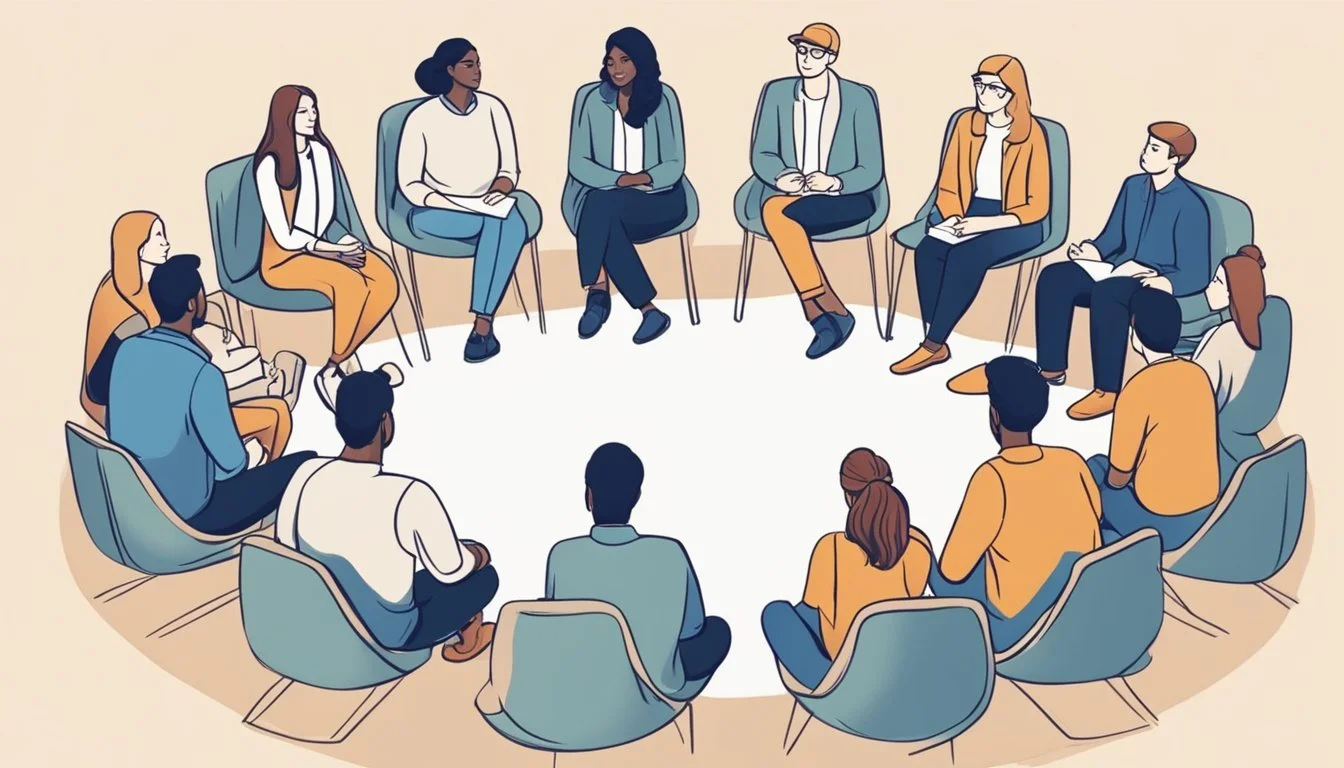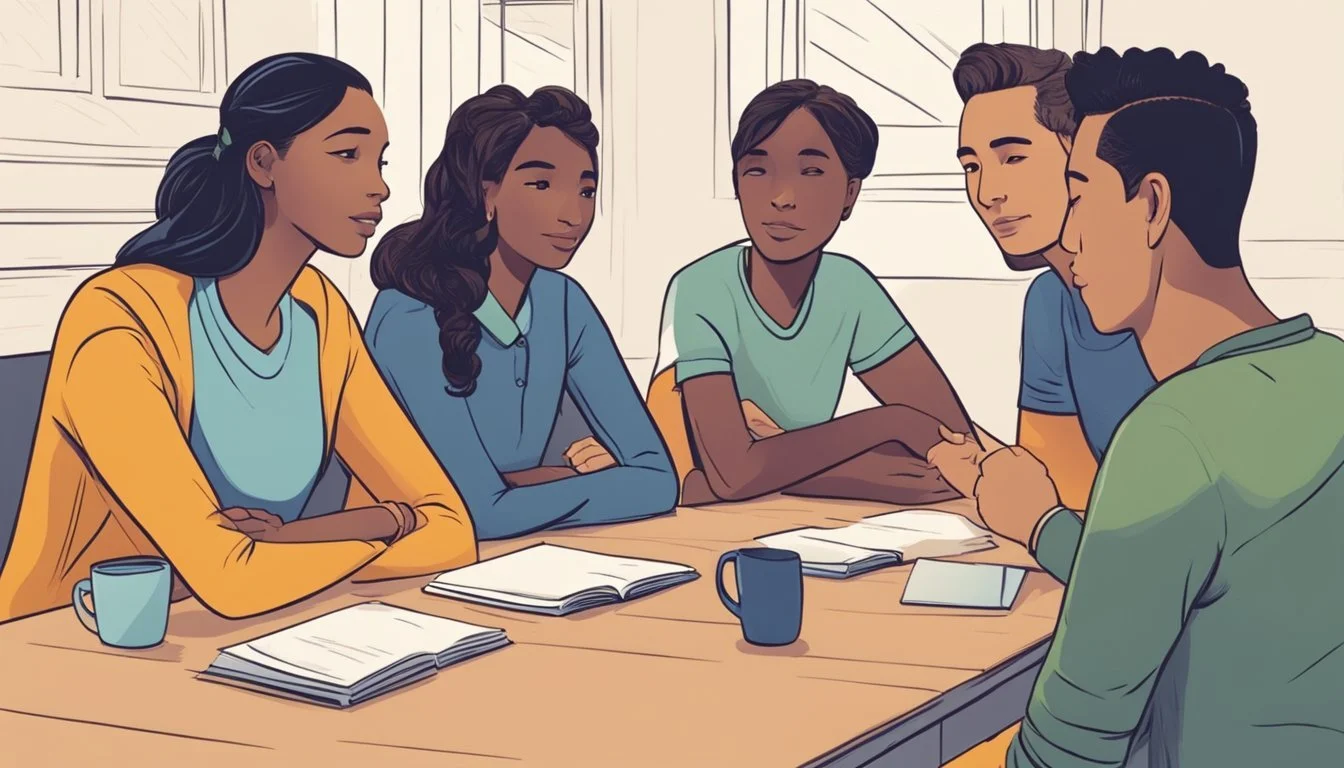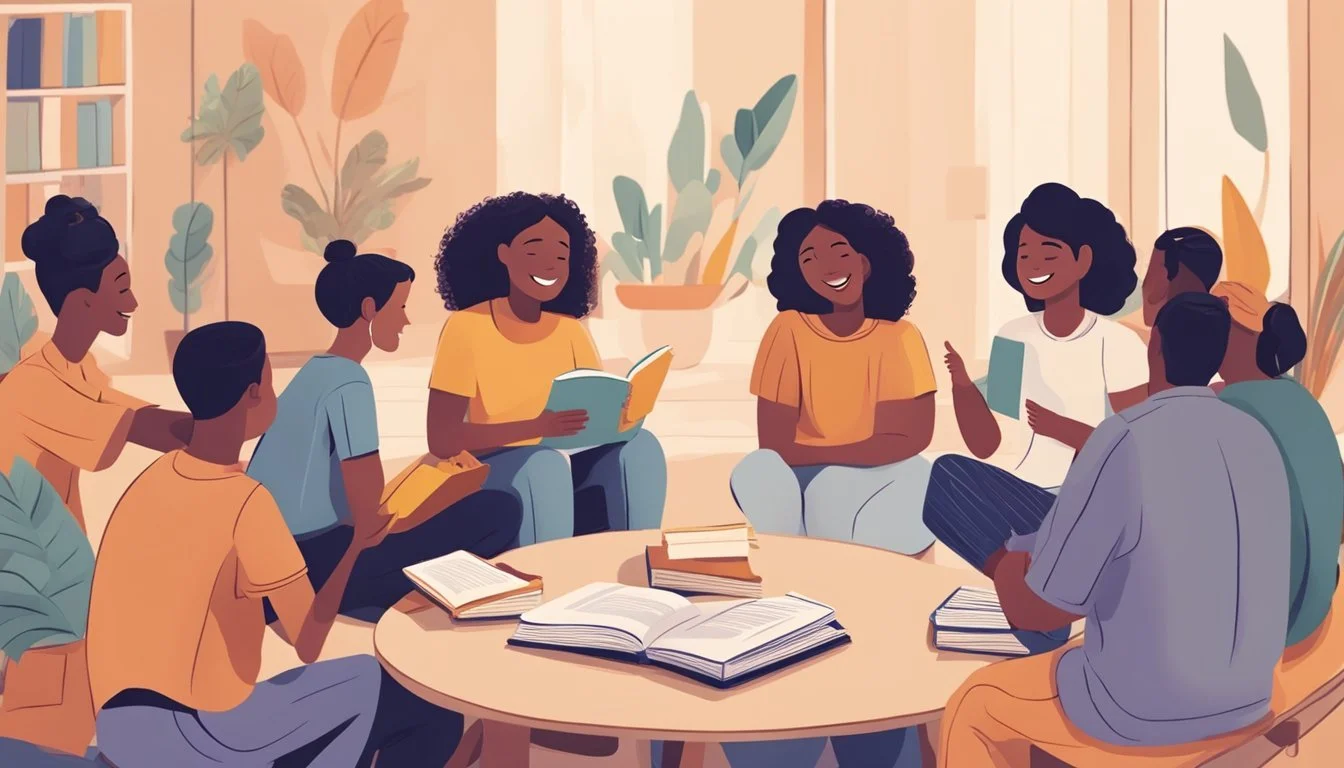7 Ways to Support a Friend Who's Struggling with Body Image Issues
Practical Tips
Supporting a friend who is struggling with body image issues can be challenging, but it is an important way to show compassion and care. Body image issues can have a significant impact on mental health, relationships, and daily life. Knowing how to approach this topic and offer practical, empathetic support can make a significant difference in someone's well-being.
Friends and loved ones play a crucial role in providing a safe space and promoting positive body image. Understanding the complexities and emotions involved allows for more supportive interactions. This article will explore actionable ways to help friends navigate their body image challenges with confidence and kindness.
1) Listen Actively to Their Concerns
Listening actively is crucial when supporting a friend struggling with body image issues. This involves fully focusing on what they are saying rather than planning your response. Acknowledge their feelings without judgment.
Active listening entails giving them your undivided attention. Make eye contact and nod to show you are engaged. Use phrases like "I understand that this is hard for you."
Ask open-ended questions to encourage them to share more about their feelings. This can help them feel heard and valued. For example, ask, "How does this situation make you feel?"
Reflect on what they say by paraphrasing their words. Say, "It sounds like you're feeling..." to confirm you understand. This helps them know you are truly listening.
Avoid interrupting or offering unsolicited advice. Sometimes, they just need someone to listen without trying to fix the problem.
Use body language that shows you are present in the conversation. Maintain an open and compassionate posture. This nonverbal communication is vital in making them feel supported.
By practicing active listening, you can create a safe space for them to express their concerns. This approach not only demonstrates empathy but also builds trust and support in your relationship.
2) Avoid Making Body-Focused Comments
Steer clear of comments that focus on a friend's physical appearance. Even well-intentioned remarks can inadvertently reinforce negative self-perceptions. Focus on qualities that aren't related to their body, such as their kindness or intelligence.
Complimenting someone's weight loss or appearance might seem positive, but it can highlight insecurities. Instead, consider acknowledging their achievements or efforts in areas unrelated to appearance.
References to dieting or body changes can also trigger anxiety. Disengage from conversations about weight, diets, or specific body parts. This helps to create a supportive environment where they feel valued for who they are, not how they look.
If discussions about appearance arise, gently redirect the conversation. For example, talk about interests, hobbies, or shared experiences that build connection without focusing on physical traits. This helps cultivate a healthier self-image and strengthens your relationship through mutual interests. For more detailed tips on supporting someone struggling with body image, visit Psych Central.
3) Encourage Professional Help or Counseling
Suggesting professional help can be crucial for a friend struggling with body image issues. Mental health professionals like psychologists or counselors have specialized training to provide the right support and interventions.
Encourage your friend to seek out a therapist who specializes in body image and self-esteem. This ensures they receive targeted help that’s tailored to their needs.
Offering to assist with finding a therapist can make the process less daunting. You could help them research therapists or make an initial phone call. Sometimes, just having someone by their side can ease their anxiety about starting treatment.
Remind them seeking professional help is a sign of strength, not weakness. Nurturing mental health is just as important as physical health, and professionals can provide valuable coping strategies and insights.
For additional support, check out 10 Ways to Support a Friend Struggling with Mental Health which emphasizes the importance of professional help.
Avoid forcing your friend into treatment, as this can feel overwhelming and counterproductive. Allow them to have control over their decisions while gently encouraging professional support. This empowers them and respects their autonomy.
4) Share Body Positive Resources
Sharing body positive resources can make a significant impact on someone struggling with body image issues. These resources can include books, websites, social media accounts, and podcasts that promote a healthy and realistic view of body diversity.
Books such as "Body Respect" by Linda Bacon and Lucy Aphramor discuss the science of health and body diversity, and "The Body Is Not an Apology" by Sonya Renee Taylor promotes radical self-love and body acceptance.
Websites like Psych Central offer actionable advice on how to improve body image and mental health. Similarly, Supportiv provides insights into supporting someone with body image issues, including showing support during meals and other everyday activities.
Sharing social media accounts that promote body positivity can also be beneficial. Look for accounts featuring diverse body types and encouraging self-love and acceptance. These accounts can serve as daily reminders that all bodies are beautiful and worthy of respect.
Podcasts such as "Food Psych" by Christy Harrison provide discussions on intuitive eating and body positivity. Listening together can spark meaningful conversations and reinforce positive body image messages.
Utilizing these resources can create a supportive environment, helping your friend feel less isolated in their journey toward body acceptance.
5) Compliment Them on Non-Physical Qualities
Focus on their internal strengths. Praise their kindness, creativity, or problem-solving skills. Highlighting these aspects can boost their self-esteem and remind them that their value goes beyond appearance.
Acknowledge their personal achievements. Whether it's being great at their job or helping others, genuine recognition matters. This can make them feel appreciated for who they are, not just how they look.
Point out positive personal traits. Mention how much you admire their optimism, resilience, or sense of humor. These compliments can uplift them and provide a sense of identity that’s unrelated to physical appearance.
Recognize their impact on you and others. Acknowledge how they’ve inspired or supported you. Statements like "You inspire me with your dedication" can be very powerful in showing their worth through actions and character.
For more ideas, check out this list of non-physical compliments. It offers various ways to appreciate the inner qualities of those you care about.
6) Engage in Healthy Activities Together
Participating in healthy activities can greatly benefit someone who is struggling with body image issues. Physical activities release endorphins, which improve mood and provide a positive focus.
Walking, hiking, or biking are great ways to get moving. These activities don't have to be intense workouts but can be enjoyable, casual outings.
Introducing activities like yoga or meditation can also be beneficial. These practices promote mindfulness and help in developing a healthier relationship with one's body.
Group sports or fitness classes can be fun and social. They provide a sense of community and belonging, which can be uplifting.
Cooking nutritious meals together can be another way to support them. This fosters a positive attitude towards food and nutrition without putting pressure on dieting.
Exploring hobbies and interests that are not appearance-focused can also help. This shifts the focus from their body to their skills and talents.
7) Educate Yourself on Body Image Issues
Understanding body image issues can make a significant difference in offering effective support. Educating oneself helps in recognizing the complexities and challenges faced by someone struggling with body image.
Learning about the psychological and social factors contributing to body image issues is essential. These factors include media influence, self-esteem, and societal standards of beauty.
Familiarizing oneself with common signs of negative body image can aid in early intervention. For instance, individuals may make frequent negative comments about their appearance or obsess over their weight and shape.
Consulting reputable resources provides accurate information. Websites such as Supportiv offer insights and practical advice on supporting those with body image concerns.
Engaging in discussions about body positivity and health at every size can broaden one’s perspective. This approach helps in offering non-judgmental and empathetic support.
Reading articles and research studies related to body image issues equips one with knowledge to challenge misconceptions. A well-informed perspective prevents harmful comments or actions that might inadvertently support unhealthy behaviors.
Understanding Body Image Issues
Body image issues involve complex perceptions and feelings about one's body appearance. Such issues can significantly impact emotional health and self-esteem, often leading to various behavioral consequences.
What Are Body Image Issues?
Body image issues refer to negative thoughts and feelings about one's body and appearance. These issues can manifest as extreme dissatisfaction and constant comparison with others. Those affected may focus on perceived flaws, whether real or imagined, which can lead to emotional distress.
People with body image issues might engage in harmful behaviors such as excessive dieting, compulsive exercise, or avoidance of social situations. It's crucial to recognize that body image issues affect both men and women and can develop at any age.
Common Causes of Body Image Issues
There are numerous factors that contribute to the development of body image issues.
Media Influence: The portrayal of idealized body types in media can create unrealistic standards, compelling individuals to compare themselves unfavorably.
Cultural and Societal Pressures: Societal norms often dictate specific body types as desirable, contributing to body dissatisfaction.
Personal Relationships: Comments or criticisms from family and peers can profoundly impact one's self-perception.
Mental Health Conditions: Conditions such as anxiety, depression, and eating disorders are often intertwined with body image concerns.
In summary, the causes are multifaceted and may involve a combination of internal and external influences that shape how individuals perceive and feel about their own bodies.
Communicating with Sensitivity
When communicating with a friend who has body image issues, it's crucial to use considerate language and practice active listening to ensure they feel supported and understood.
Language to Avoid
Using the right language is vital. Avoid making comments that focus on appearance or weight, such as "You look so skinny" or "Have you lost weight?"
These remarks can reinforce negative self-perception. Instead, focus on non-appearance-based compliments like, "You’re so thoughtful" or "I love your creativity."
Steer clear of any jokes or sarcastic comments about body types, diet, or exercise. Even if meant humorously, these can be very hurtful.
It's also important not to offer unsolicited advice on diet or exercise. Suggestions like, "You should try this diet," can be intrusive and unwelcome. Respect their autonomy and provide only support and empathy.
Active Listening Techniques
Active listening is essential. First, give them your full attention. Put away distractions and maintain eye contact. Use nodding and verbal cues to show you are engaged.
Paraphrasing their words shows understanding. For example, "It sounds like you’re feeling frustrated with how you look." This validates their feelings.
Second, ask open-ended questions that encourage them to share more about their experiences and feelings. Questions like, "How have you been coping?" can prompt deeper conversations.
Avoid making the conversation about your own experiences unless specifically asked. The focus should be on their feelings and struggles. Your goal is to create a safe space for them to express themselves without judgment.
Encouraging Positive Habits
Encouraging friends to adopt positive habits can help them build a healthier body image and enhance their overall well-being. It's important to focus on practical and supportive activities that foster self-acceptance and self-care.
Promoting Healthy Activities
Engaging in physical activities together can be a great way to promote a healthy lifestyle. Suggest activities like walking, hiking, or joining a fitness class together. These actions not only improve physical health but also provide an opportunity for social bonding.
Recommending activities such as yoga or dance can be particularly beneficial because they combine physical exercise with mental relaxation. These forms of exercise promote body awareness and help in reducing stress while fostering a positive connection with one's body.
It's also essential to encourage participation in hobbies that they enjoy and that make them feel good about themselves. Painting, gardening, or playing a musical instrument can serve as a form of self-expression and provide a necessary distraction from negative body image thoughts.
Supporting Self-Care Practices
Self-care practices enhance mental health and support positive body image. Encourage your friend to develop a routine that includes daily self-care activities. Simple acts like taking a relaxing bath or dedicating time to read a favorite book can make a significant difference.
Remind them of the importance of a balanced diet and adequate sleep. Nutrition and rest play crucial roles in mental and physical health. Suggest meal planning or cooking healthy meals together. Share recipes or plan a fun grocery shopping trip to make it a more engaging experience.
Encouraging mindfulness practices such as meditation or journaling can also be effective. These practices help in reflecting on positive aspects of one's life and can improve self-awareness and acceptance. Aim to discuss the benefits of these practices and perhaps suggest specific apps or resources to get started.







